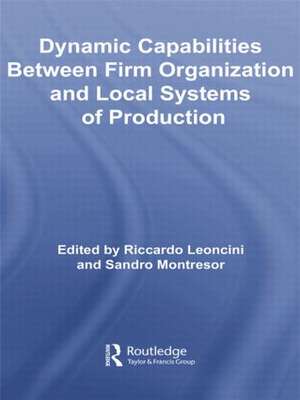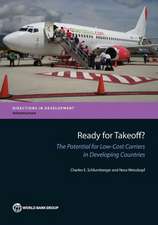Dynamic Capabilities Between Firm Organisation and Local Systems of Production: Routledge Studies in Global Competition
Editat de Riccardo Leoncini, Sandro Montresoren Limba Engleză Paperback – 15 aug 2014
This book brings together several contributions aimed at showing how firms’ differential exploitation of their dynamic capabilities comes to be highly dependent on the role of socio-territorial entities and on the institutional set up. Thus, different formal and informal types of organization are observed at different levels of analysis. In so doing, the book aims at conveying a transversal perspective to the analysis of firms’ dynamics, calling for a multidisciplinary and multilayer approach.
Din seria Routledge Studies in Global Competition
-
 Preț: 327.10 lei
Preț: 327.10 lei -
 Preț: 415.29 lei
Preț: 415.29 lei - 18%
 Preț: 1056.80 lei
Preț: 1056.80 lei -
 Preț: 466.88 lei
Preț: 466.88 lei - 18%
 Preț: 1123.68 lei
Preț: 1123.68 lei - 16%
 Preț: 274.33 lei
Preț: 274.33 lei -
 Preț: 463.40 lei
Preț: 463.40 lei -
 Preț: 140.53 lei
Preț: 140.53 lei - 18%
 Preț: 1114.70 lei
Preț: 1114.70 lei -
 Preț: 462.85 lei
Preț: 462.85 lei - 25%
 Preț: 829.02 lei
Preț: 829.02 lei - 18%
 Preț: 1166.68 lei
Preț: 1166.68 lei - 18%
 Preț: 1066.09 lei
Preț: 1066.09 lei - 26%
 Preț: 850.37 lei
Preț: 850.37 lei - 18%
 Preț: 1109.99 lei
Preț: 1109.99 lei -
 Preț: 496.35 lei
Preț: 496.35 lei - 22%
 Preț: 297.62 lei
Preț: 297.62 lei - 18%
 Preț: 1282.35 lei
Preț: 1282.35 lei -
 Preț: 464.93 lei
Preț: 464.93 lei - 18%
 Preț: 1062.98 lei
Preț: 1062.98 lei - 12%
 Preț: 339.31 lei
Preț: 339.31 lei -
 Preț: 388.50 lei
Preț: 388.50 lei -
 Preț: 472.23 lei
Preț: 472.23 lei - 16%
 Preț: 248.97 lei
Preț: 248.97 lei -
 Preț: 472.23 lei
Preț: 472.23 lei - 34%
 Preț: 1185.83 lei
Preț: 1185.83 lei - 16%
 Preț: 129.96 lei
Preț: 129.96 lei - 18%
 Preț: 1162.39 lei
Preț: 1162.39 lei -
 Preț: 405.80 lei
Preț: 405.80 lei - 18%
 Preț: 1055.38 lei
Preț: 1055.38 lei - 25%
 Preț: 826.86 lei
Preț: 826.86 lei -
 Preț: 447.51 lei
Preț: 447.51 lei - 18%
 Preț: 1064.01 lei
Preț: 1064.01 lei - 25%
 Preț: 527.96 lei
Preț: 527.96 lei - 18%
 Preț: 1052.35 lei
Preț: 1052.35 lei - 18%
 Preț: 1172.50 lei
Preț: 1172.50 lei - 18%
 Preț: 718.40 lei
Preț: 718.40 lei - 25%
 Preț: 557.95 lei
Preț: 557.95 lei - 26%
 Preț: 820.40 lei
Preț: 820.40 lei -
 Preț: 467.44 lei
Preț: 467.44 lei - 34%
 Preț: 988.54 lei
Preț: 988.54 lei - 18%
 Preț: 1168.76 lei
Preț: 1168.76 lei - 18%
 Preț: 1056.00 lei
Preț: 1056.00 lei
Preț: 473.20 lei
Nou
Puncte Express: 710
Preț estimativ în valută:
90.54€ • 95.04$ • 75.15£
90.54€ • 95.04$ • 75.15£
Carte tipărită la comandă
Livrare economică 10-24 aprilie
Preluare comenzi: 021 569.72.76
Specificații
ISBN-13: 9781138010482
ISBN-10: 1138010480
Pagini: 432
Ilustrații: 35 black & white illustrations, 66 black & white tables, 35 black & white line drawings
Dimensiuni: 156 x 234 x 22 mm
Greutate: 0.59 kg
Ediția:1
Editura: Taylor & Francis
Colecția Routledge
Seria Routledge Studies in Global Competition
Locul publicării:Oxford, United Kingdom
ISBN-10: 1138010480
Pagini: 432
Ilustrații: 35 black & white illustrations, 66 black & white tables, 35 black & white line drawings
Dimensiuni: 156 x 234 x 22 mm
Greutate: 0.59 kg
Ediția:1
Editura: Taylor & Francis
Colecția Routledge
Seria Routledge Studies in Global Competition
Locul publicării:Oxford, United Kingdom
Public țintă
PostgraduateCuprins
Introduction Part 1: Firm and Organisational Level 1. Learning and Firm Dynamics: Theoretical Approaches and Empirical Analysis of Dynamic Capabilities 2. Dynamic Capabilities and Entrepreneurial Team Development in SMEs 3. Group Dynamics and Growth Strategies 4. Demand for Skilled Labour Services, Job Design and the ‘Revealed Learning Function’ Part 2: Local and Mesoeconomic Level 5. A Morphogenetic Approach to the Evolution of Technological Capabilities 6. Global Value Chains and Technological Capabilities: A Framework to Study Industrial Innovation in Developing Countries 7. Learning at the Boundaries for Industrial Districts between Exploitation of Local Resources and the Exploration of Global Knowledge Flows 8. The Role of Agglomeration and Technology in Shaping Firm Strategy and Organization 9. MNC-dominated Clusters and the Upgrading of Domestic Suppliers: The Case of Costa Rican Electronics and Medical Device Industries Part 3: Sectoral and Macroeconomic Level 10. Macrodynamic Capability: Concept and Monetary and Financial Conditions 11. Knowledge Endowment and Composition as Dynamic Capabilities 12. Vertical and Horizontal Patterns of Intra-industry Trade between EU and Candidate Countries 13. ICTs and the Digital Division of Labour 14. Persistent Seasonality of Demand and Local Tourist Market Development
Descriere
This book offers an analysis of how firms manage to reconfigure their pool of resources, to deal with the turbulent environments in which they are embedded, thus tackling the issue of how dynamic capabilities must be defined and conceptualized.





















